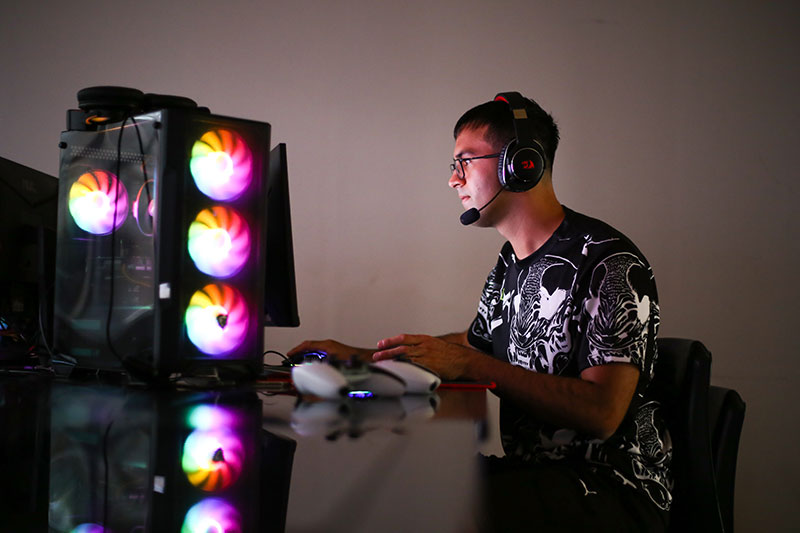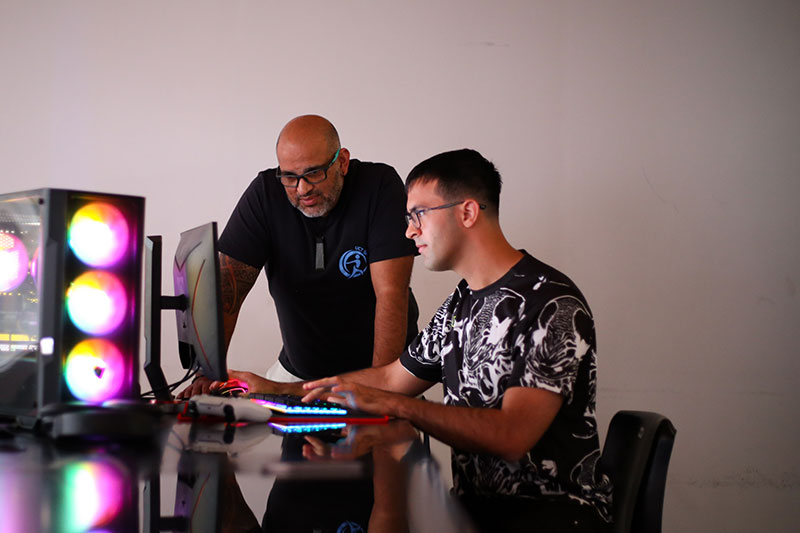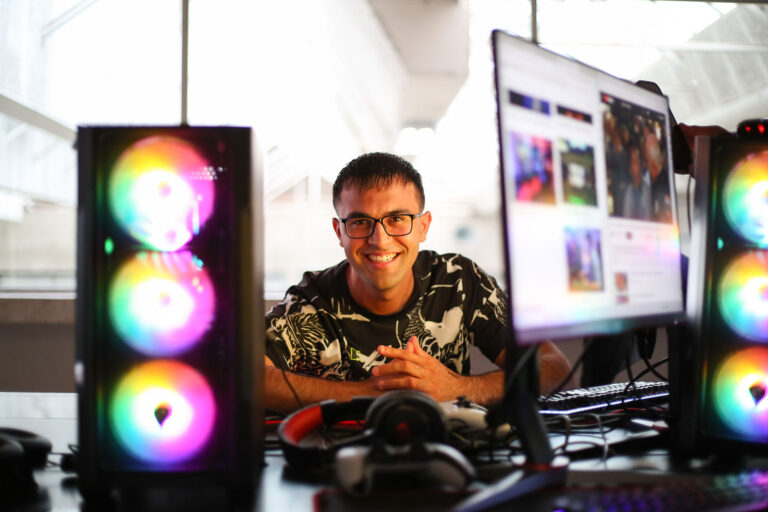With frequent, long stints in front of their computer, the average gamer is a sedentary night owl, often compromising sleep – especially quality sleep – and being exposed to too much blue light. The topic was explored in University of Cape Town (UCT) doctoral student Chadley Kemp’s doctoral thesis, an in-depth study of more than 70,000 words.
Kemp’s research into habitual play activities is supervised by Associate Professor Dale Rae, a sleep researcher and senior lecturer at the Center for Health in Physical Activity, Lifestyle and Sport (HPALS) from the Faculty of Health Sciences.
This work is based on Kemp’s research conducted in 2018 as part of a Masters of Medical Science in UCT’s former Department of Exercise Science and Sports Medicine at the Institute of Health Sciences. South African sport. This was upgraded to a doctorate in 2020.
His research (he is an esports and video game enthusiast) explores sleep, health status, light exposure patterns and physical activity of adult esports players.
“We know that sleep affects mental functioning in general, but we didn’t know to what extent this applied to esports players,” Kemp said.
Framework for healthier gameplay
Kemp’s goal is to produce objective data that will guide the development of a framework to promote healthier gaming standards and encourage policy reform within the esports industry.
The tests they used to assess neurocognitive performance were intended to serve as a proxy for certain aspects of esports performance because they tested specific mental skills important for gaming, he added.

“We thought this would be a useful addition to forcing players to make better sleep and lifestyle behavior changes if it meant… their health would improve and they would experience better performance in the game. game – and would have an advantage over their competitors!
Kemp’s focus is not on professional gamers, but on what he calls “the missing middle” of the esports community: amateur and semi-competitive gamers.
“This group does not benefit from the same infrastructure and support as their professional counterparts,” he explained. “But what makes them particularly interesting is the fact that they have to balance their gaming commitments with having a job, studying or juggling family or domestic obligations.”
Global appeal
Esports is booming all over the world – and not just among competitive gamers but also among the public. Write in the South African Journal of Sports MedicineKemp and his co-authors noted that globally competitive gaming alone attracts 532 million fans, according to statistics released in 2022.
However, his study was not prompted by an influx of gamers presenting with sleep difficulties to Associate Professor Rae’s sleep consultancy, Sleep science. Rather, it stems from a broader observation and concern within the local esports community regarding gamers and gamers. poor quality and short sleep, high levels of sedentary lifestyle and excessive exposure to artificial or electronic nighttime.
Based on these conversations and supported by anecdotal evidence from the esports industry, Kemp said he and Rae were able to determine that reducing sleep had seemingly become a “rite of passage” among gamers. Mostly, Most games take place at night due to players’ daytime commitments.
“We also included non-gamers in our study, so we could compare our players to people who weren’t gamers.”
As there was not much literature on the subject (much of it focuses on the implications of gaming in children and adolescents) and most studies were survey-based and did not target gamers esports or those who regularly indulged in gaming, there was a knowledge gap that needed to be filled. As a demographic, Kemp is particularly interested in adult esports players due to the higher health risks posed by age and unhealthy lifestyle factors, such as smoking and alcohol consumption .
Because he needed a tool to measure sleep and physical activity simultaneously, he validated the Actiwatch, a special research device, to do so. The device also measures light exposure. For his sample group, Kemp recruited eligible esports players and measured the variables of interest. These included clinical measures (anthropometry, blood pressure, blood markers) and self-report data (questionnaires on sleep, chronotype, daytime sleepiness and game addiction) and their cognitive performance.
“We also included non-gamers in our study, so we could compare our players to people who weren’t gamers. In total, we had 59 male participants (31 players; 28 non-players). (Women who volunteered to participate did not meet the study’s inclusion criteria.) For a week, these people wore the Actiwatch to track their sleep, physical activity, and light exposure.

Main findings
The main conclusions of his research are interesting to read:
- Esports players have comparable sleep duration to non-gamers (control group), but tend to sleep later than others. They reached the middle of their sleep cycle around 4:08 a.m., compared to 3:01 a.m. for the control group.
- A much higher percentage of esports players (45.2%) showed nocturnal habits (or evening chronotypes), meaning they are more active and alert at night. This contrasts with only 7.1% of the control group showing similar evening trends.
- They took more naps during the day, but their nighttime sleep duration was similar to that of the control groups.
- There was no significant difference in heart disease or metabolic disease risks between the two groups, which Kemp said may be related to their young age. But most health markers were tentatively elevated, which could indicate worse cardiometabolic health in the future.
- Esports players smoke more.
- Esports players performed better on brain tasks, showing better attention and accuracy and making fewer errors.
- Esports players are less active than the control group. They sit more (11.2 hours versus 9.1 hours per day) and are less physically active, whether it is moderate or vigorous intensity activity.
- Esports players have specific active and inactive hours. They are less active early in the morning and some evening hours, but most active around midnight.
- Esports players are exposed to dimmer light for a greater portion of their day, and their exposure to bright light occurs later at night.
This work is important for several reasons, Kemp said. A key point of research concerns chronotypes.
“Esports players appear to have sleep patterns that match those of night owls and this may be influenced by both their natural tendencies and their gaming habits. It is also possible that a genetic predisposition and l Exposure to artificial light from screens collectively contributes to these sleep patterns.
“The combined effect is thought to create a cycle in which their preference for evening activities leads to more play, which reinforces night owl tendencies.” This impacts the quality and quantity of their sleep.
He added: “Perhaps most obviously, gaming is a hugely popular phenomenon that transcends age, gender and geography. It is a dominant form of entertainment and its competitive side, esports, is progressing towards acceptance as a true form of sporting competition.
“However, the problem is that if you don’t get enough sleep, those improved skills could take a hit.”
From a neurocognitive perspective, it is clear that gaming can strengthen several cognitive abilities, such as attention and problem solving.
“However, the problem is that if you don’t get enough sleep, these improved skills could suffer,” Kemp said. “Players might experience slower reactions, faulty decision-making, and even a drop in in-game stamina. So while the game certainly has its merits and may even boost some mental abilities, it is not without health considerations. “
Kemp’s research aims to ensure that anyone engaged in gaming or esports does so in a healthy way.
“The goal is to create a springboard towards health regulations in gaming and esports,” he said. “By raising awareness and providing evidence-based recommendations to prevent chronic health problems caused by unhealthy gambling behavior, it supports individual decision-making, governments and policy makers. This is valuable to anyone involved or affected by the game.”
Kemp’s Guidelines for Players:
- Get seven to nine hours of sleep a night and stick to a regular sleep schedule (also on weekends).
- Set fixed wake and sleep times to establish a more robust sleep-wake cycle.
- For better sleep, make sure your bedroom is dark, quiet and cool (16-18°C is optimal).
- Limit the amount of light exposure in the hours before bed (including light from phones, laptops, TVs, etc.).
- Limit caffeine to morning and afternoon. That means no energy drinks during those late-night gaming sessions).
